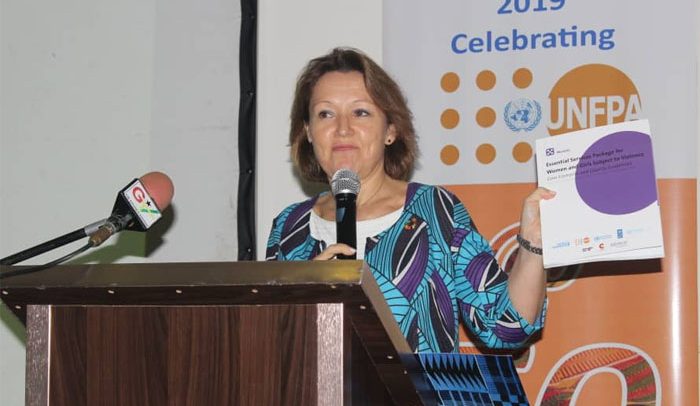Anne Claire Dufay – UNICEF Country Rep speaking at the event
WOMEN AND girls who suffer sexual and gender based violence can now have access to improve essential services with the launch of a new document.
The ‘Essential Services Package for Women and Girls Subject to Violence’ forms part of the United Nations (UN) agencies’ partnership to provide greater access to a coordinated set of essential and quality multi-sectoral services for all women and girls who have experienced gender based violence.
It seeks to address the issue of fragmented services often provided to victims of such violence by identifying the essential services to be provided by the health, social services, police and the justice sectors.
It also spells out the guidelines for the coordination process and mechanisms for service delivery of the core elements of each essential service to ensure high quality service for women and girls experiencing violence.
The document which was launched in Accra by the UN system was produced with support of UNFPA’s West and Central Africa Regional Office (WCARO).
Anne Claire Dufay, UNICEF Country Representative and UN Resident Coordinator in Ghana, who launched the document, and opened a three-day workshop for stakeholders, stressed the importance of effective coordination in the provision of essential services to victims of gender and sexual based violence.
She said “it is very important to coordinate effectively to ensure that we have a solid protections system for women, for girls, for children in place with good data, good referral mechanism and good case management.”
She again noted that the SDGs cannot be attained if the issue of gender and sexual based violence is not addressed thus urging the relevant stakeholders to make the implementations of the provisions of the document a priority.
Deputy UNFPA Country Representative Ghana, Erica Goldson, in her remarks said the 2030 Agenda for Sustainable Development explicitly targets the end of discrimination and elimination of all forms of violence and harmful practices against all women and girls.
However, she said despite the many commitments to eliminate discrimination against women and girls, it remains pervasive in every society and country with victims often lacking access for safety and protection.
Therefore this document she said see to it that every victim of violence have prompt access to the full range of essential services, including sexual and reproductive health services, support to ensure mental and physical health, well-being, and safety, and access to justice.
“This means that survivors of physical and sexual violence must have rapid access to a health clinic that can and will administer emergency medical care and counseling; they must have access to the police to file a criminal report, and a respectful, informed reception,” she noted.
She added that “and they must have access to medical practitioners who can conduct a forensic examination within 72 hours of the attack, and who they are able to consult within their cultural requirements.”
The UNFPA Deputy Country Representative further observed that the provision of the essential services would include a safe place for a woman and her children, if she is experiencing domestic violence, or is a victim of trafficking.
“In all cases, it is essential to place women’s full human rights at the centre of any response. These services not only provide immediate support and recovery, they will help us to stop impunity,” she stressed.
By Jamila Akweley Okertchiri & Sarah Platz


